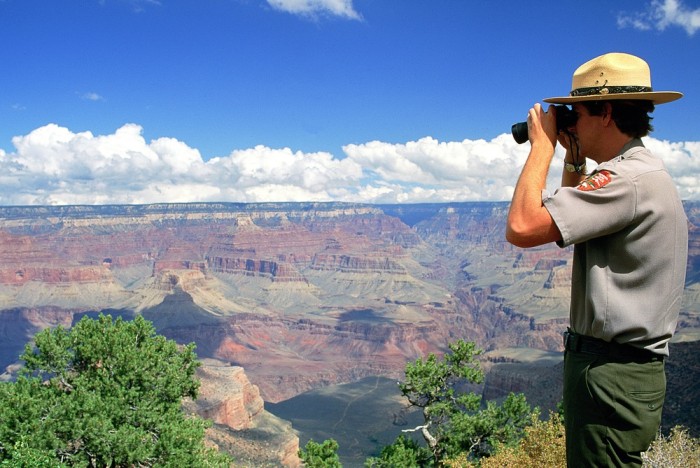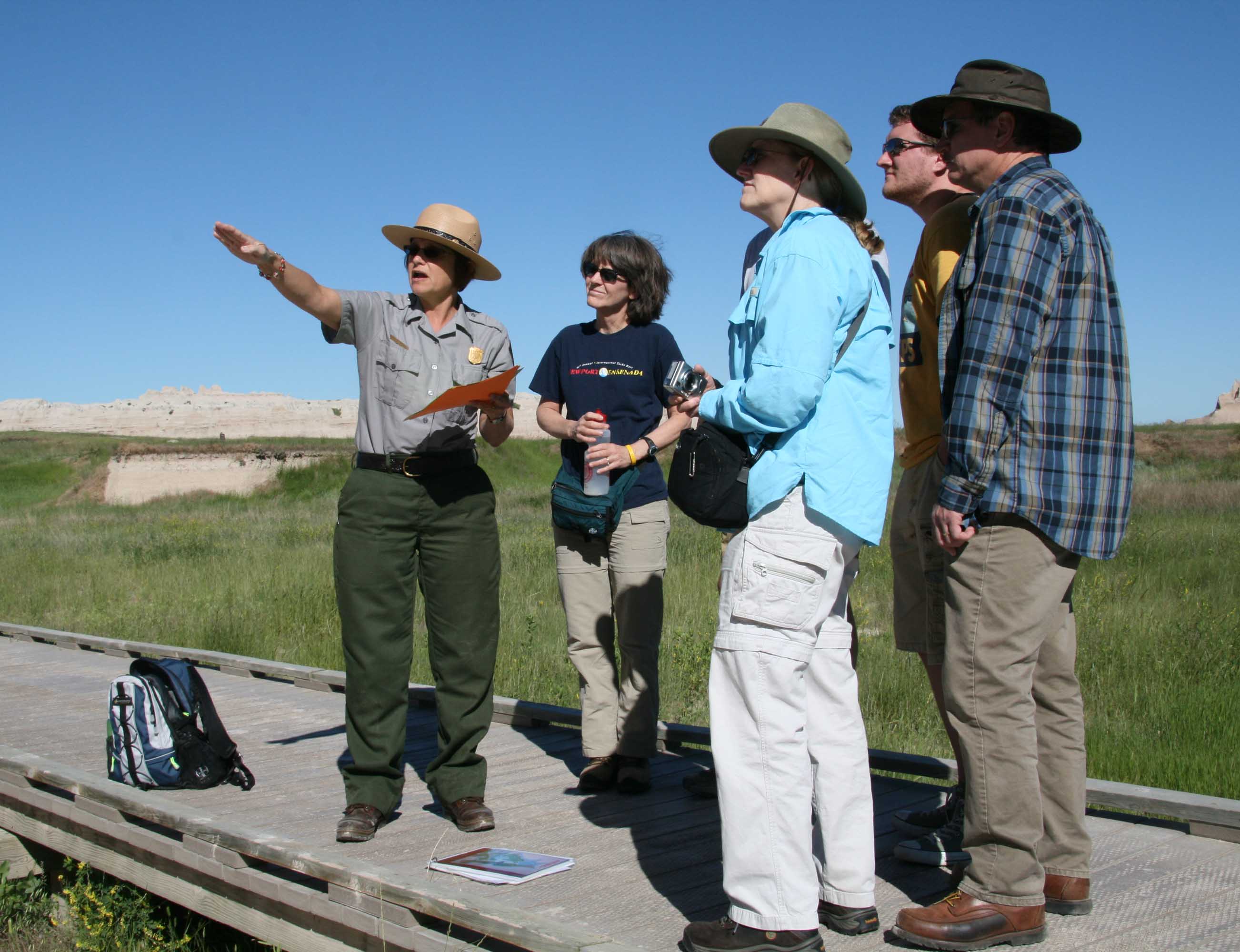 |
| Its a lot less of this than you think Source: The Today Show |
I work as a park ranger for the Maryland Park Service and some of the most common questions I get from visitors are variants of "Is your job the best job ever?" The question is then usually followed by, "I would love to be a park ranger, I love going to parks so I'm sure I would be a natural." Well, zeal for nature is a key ingredient for any aspiring ranger but the job is a little more complex than that. That's why I would like to take a few moments to explain what it is really like to work as a park ranger.
The first thing that anyone looking into this career should know is that park ranger positions are quite competitive. Americans are much more environmentally conscious than they were in the past and many also desire atypical work environments, having been burnt out in the standard 9-5 office setting. Thus park services in both the state and federal level always have a healthy batch of applicants for every job that they advertise. Ground-level positions with the National Park Service are notorious for being extremely competitive and an applicant will need much more experience than the requirements specify to stand out amongst the crowd. I recommend starting at the state level and gaining experience there before seriously attempting to get a job with the National Park Service. Many parks or reserves will not even consider applicants who do not either have a relevant degree or a few years of environmental experience under their belts. Rangers are, above-all, the stewards of the natural sites on which they work and it is important that they have a good understanding of the science that governs such places.
Another thing that must be understood about this job is that most rangers get their feet wet as seasonal workers. Park services depend greatly on seasonal workers. Most parks will only have a small contingent of year-round staff and will hire the bulk of their workforce for only a portion of the year. This has its advantages and disadvantages. The most obvious disadvantage is that you do not have job security for the entire year. Seasonal rangers in Maryland, for example, are only allowed to work a maximum of ten months out of the year. This means that during those other two months a ranger must either find a temporary job or live off of unemployment. However, provided you work hard and prove yourself, parks will always offer contracts to their seasonal staff for the following season. If you walk away from a season without such a promise of employment, then you failed to impress your coworkers and bosses. These seasonal contracts also allow for a great deal of flexibility and the opportunity for travel. Once a contract is up, you are free to look for employment in another park or in another state with no negative repercussions. In any other field, a large number of different positions within a short amount of time would be a negative mark on a person's resume. But in this field, it is expected that rangers will jump around to different parks in order to gain more varied experience. Parks operating in the same service will often share performance reports and will gladly accept a ranger who has proven themselves as a strong worker at another park.
So let us assume that you get the job. What can you expect from day to day? First let me say that there are two basic types of rangers: civilian rangers and law-enforcement rangers. While the duties of both types overlap in many ways, law-enforcement rangers are officers of the law and thus their primary duties are to enforce the laws of a park and protect the patrons within them. I have worked only as a civilian ranger so I can not go into further details about such work. A civilian ranger's primary duties are to patrol the park, ensure compliance with park regulations, assist visitors anyway they can, and protect the natural and historical resources of the park. This may seem a broad and wide-encompassing job description and that's because it is by design. There is a popular adage among park service's that "rangers wear many hats." What this means is that rangers assist with many facets of park operation. Within any given day rangers may run an educational program, respond to an emergency, help build a trail, clear a fallen tree, or collect money at the park entrance. Think of rangers as the renaissance workers of the park, they are expected to have diverse skill sets and be willing to do most anything. While it is exciting to be included in many different operations, not all of them are the most invigorating of duties.
 |
| This is painfully true sometimes Source: The Xenohistorian Weblog |
Despite what national park ad-campaigns and Sunday morning cartoons would have you believe, the daily duties of a ranger are not just communing with animals and leading nature hikes. I am now going to rip off the proverbial band-aid and tell you about the most challenging parts of this job. For one, be prepared to clean bathrooms every day. Most of the time this is just disinfecting and cleaning dirt off of the floors but this also means that you will have to deal with the occasional rogue poop. Be prepared for this and come to terms with this. Next, be ready to do a lot of cleaning and maintenance everywhere in the park. Despite our best efforts, people still litter in the parks. They litter a lot. Rangers always carry garbage bags in their trucks or on their persons and are ready to pick up any beer cans, pizza boxes, trail maps, water bottles, condoms, diapers, cigarette butts, plastic bags filled with strange substances, and juice boxes that they might come across. Rangers are also expected to assist with landscaping duties and will spend time behind weed-whackers and on lawnmowers.
 |
| A picture I took of all the trash picked up in only a few hours of work |
Traffic is also connected to another difficult piece of the job, dealing with angry or disorderly visitors. Civilian rangers may not be officers but we are still expected to deal with any situations that come up. Be prepared to have visitors approach you and yell about anything and everything. You are to solve what you can and provide an understanding ear for what you cannot. The key is to look for solutions while remaining firm on the regulations of the park. I often have visitors come up to me to complain about the litter in the park. My response is always to hand them a trash bag from my pocket and thank them for offering to help pick it up. That always diffuses the situation quite nicely. If someone becomes truly belligerent and aggressive than there are always your fellow rangers and local police that will be there to assist.
There is a piece of being a park ranger that can be both challenging and rewarding. That piece is when a ranger must respond to an emergency. Parks are vast places and people often get hurt or in trouble within them. Rangers are part of the response to those situations and are expected to help in any way they can when they occur. On one hand, this can be incredibly gratifying. There is no better feeling than finding a lost hiker, helping evacuate an injured mountain biker, or just helping a child get back to their parents. If you can contribute to another individual staying safe and healthy, then you will fall asleep that night feeling content.
| An example of an emergency in a park Source: ournationalparks.us |
I hope what I have reported so far has not been too discouraging. Much of what we do every day is fulfilling and inspiring work. For example, rangers often lead educational programs for both children and adults. This can include nature hikes, animal programs, or demonstrations of outdoor skills. Passing down my knowledge and experience to people who are interested in nature is one of my favorite duties as a ranger. Rangers are also expected to lead volunteer projects. This involves planning and implementing renovations with volunteer labor. Working with people donating their time and accomplishing important work is another task that can leave you feeling inspired at the end of the day. Both of these duties reach into the greater sense of accomplishment that all rangers feel.
 |
| Rangers are a source of guidance in parks Source: The National Park Service |
All in all, if you are a person who is dedicated to conservationism and does not mind getting your hands dirty or being chewed out by a stranger about parking, then becoming a park ranger could be the right decision for you. So what are some first steps you can take? Well, if you have yet to acquire a higher education then you can choose to major in a corresponding discipline, any physical science will do. Some schools do offer specific majors for this career path, like park management or forestry, such programs will definitely let you stand out amongst other applicants. If you have already gotten your degree or school is not an option, then start volunteering and get that experience. In many parks, volunteers work right alongside the rest of the park staff and are afforded the same training opportunities. This way you can see for yourself if the job is right for you and put relevant skills on your resume. Finally, you could apply for other park jobs, such as in maintenance and admissions. These positions usually have fewer requirements than the ranger positions and will also give you valuable skills and experience. Just commit yourself to developing skills and learning pertinent information and you will succeed regardless of which path you choose.
 |
| Source: BizarroComics.com |
Becoming a park ranger is not for everyone. It can be dirty. It can be stressful. It can be frustrating. But it can also be gratifying. It is a highly competitive field with fairly low monetary compensation. But you will go home every day feeling that you have contributed to the preservation of a revered public space. If you have reached this part of the article and any part of you is still intrigued by such a job, then I encourage you to give it a try. Even if you decided later that it is not for you, I promise that the season you spend working for a park will be one of the most memorable of your working life.
As a little bonus for reading my article, enjoy these hilarious yelp reviews of national parks.
No comments:
Post a Comment